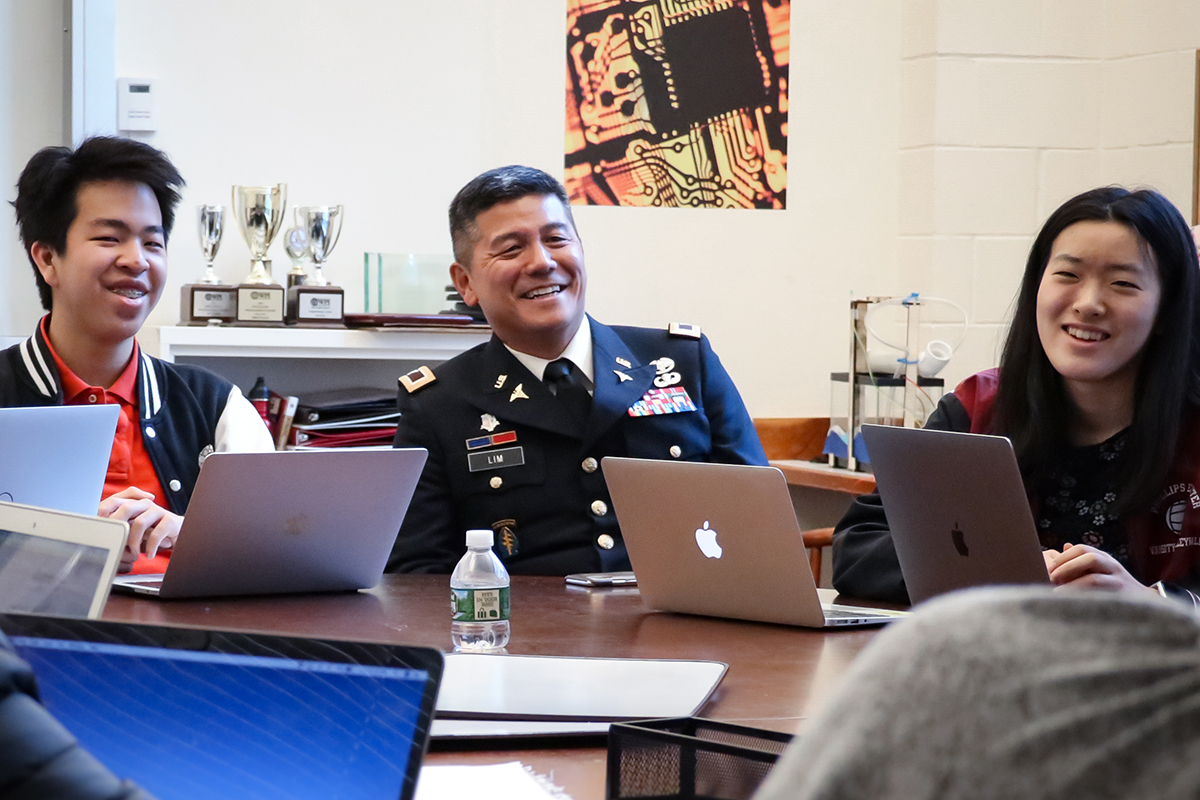Robert Lim ’87

Non-sibi didn’t define Robert Lim’s years as a student at Exeter. He was late to the idea of “not-for-oneself,” he says. But as a combat surgeon on active duty for the U.S. Army, and father to four children, one an adopted daughter with special needs, Lim embodies the Academy’s credo each and every day.
Lim returned to campus in early April to share his experiences on the battlefield with students at assembly. Proudly wearing his military uniform, Lim described his first deployment in 2002. The call to serve came just a few months after he completed his surgical residency at William Beaumont Army Medical Center. At the time, the country was still reeling from the attacks of September 11 and the threat of Saddam Hussein and weapons of mass destruction.
As a sandstorm raged outside his mobile surgical tent in the Iraqi desert, he recalled, he put on his body armor, his chemical protective gear, his medical scrubs. In 100-degree heat, he focused on the moment and the wounded patients. He relied on his training to save the lives he could, often making difficult choices. Lim went on to be deployed five more times to combat zones, for four to six months on each occasion, and is highly-decorated for his service.
Beyond the battlefield
But Lim’s efforts reach far beyond the front lines. As an associate professor and Chief of Minimally Invasive Surgery at Tripler Army Medical Center in Hawaii, he focuses on obesity care for veterans, surgical education for his fellow doctors, and refining advanced laparoscopic surgical techniques. He draws on his own first-hand experience and conclusions made mining empirical data sets to improve patient outcomes. He has published two textbooks on these topics and his third, “Multidisciplinary Approach to Surgical Problems,” will be out in May. “My hope is that what I am able to teach, someone can take that and go further and continue to make things better for our patients and for the system in general.”
Inspired by the Excelsior Surgical Society, originally conceived during WWII by Winston Churchill, and with the help of the Society of American Gastrointestinal and Endoscopic Surgeons (SAGES), Lim founded the first tri-service military surgical symposium in the United States to ensure military doctors had the opportunity to exchange ideas and learn from one another. “It’s very Harkness,” he says, describing the confab of surgeons from the Army, Navy and Air Force. “We bring different ranks and services together to focus on trauma care. What started as just some guys sitting in the back of a conference room is now the strongest meeting for military general surgeons in the world.”
Medicine’s technological future
After assembly, Lim headed to Computer Science Instructor Colleen Brockmyre’s D Format class to see “what the next generation is up to,” he said, adding, “the future of surgery will come from algorithm review and computer-based analysis of data because the human mind has its limits.” One student shared details of his current coding project, a program designed to classify images, explaining how it worked, what its limitations were. The class leaned in and launched into a spirited discussion of data. How best to gather it? Analyze it? Use it?
Conversation soon turned back to Doctor Lim: “How much of the surgery you do is the robot and how much is you?” asked one student. It’s a question that Lim has spent a lot of time thinking about. “I still believe in the art of medicine and the science of medicine,” said Lim, who was a studio arts major at Davidson College, while also taking pre-med classes and participating in the Reserve Officer Training Corps. “I use robotic arms, CT scans, MRIs … sometimes four robotic arms at a time. But I still use my own clinical judgment. If you’re going to make patient outcomes better, you have to use technology, but the decision to operate is still a very human decision.”
— Jennifer Wagner